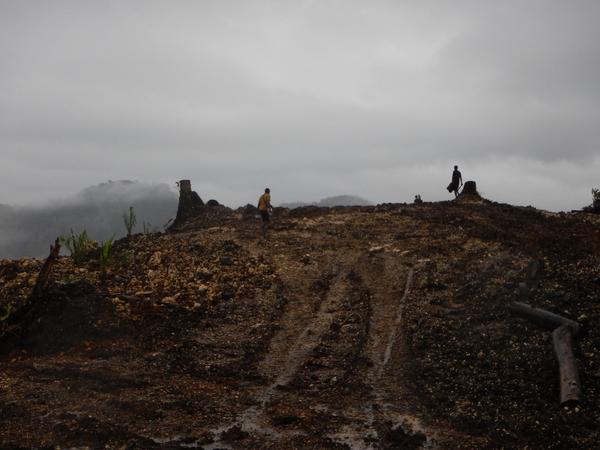
Source: Global Witness
Global Witness is urging Papua New Guinea to block a bid by one of Malaysia’s biggest logging companies, Rimbunan Hijau, to renew a license that permits it to flatten over 40,000 hectares of tropical rainforest in order to grow oil palm. This is due to serious concerns relating to:
- Allegations that the companies that sub-leased the land to Rimbunan Hijau used fraud and forgery to obtain it.
- Evidence of illegal child labour and health risks at the oil palm plantation, which challenge Rimbunan Hijau’s claims that it is seriously investing in local communities.
- Claims by communities living in and around the licensed area that the project is negatively impacting their livelihoods, health and way of life.
- Major damage to invaluable rainforest reserves and Papa New Guinea’s freshwater ecology as a result of oil palm development.
On 4th September, Papua New Guinea’s Forest Board will decide whether Rimbunan Hijau’s clearance permit in Pomio, East New Britain Province, should be renewed. The permit straddles three Special Agriculture and Business Leases (SABLs), a leasing arrangement that has sparked longstanding controversy due to allegations of fraud and abuse in the acquisition and use of land. In June, Prime Minister Peter O’Neill pledged to cancel any such licenses that were acquired illegally.
Global Witness has seen evidence of forgery in the documents that underpin the SABL belonging to one of the companies that leased to Rimbunan Hijau, called Ralopol Investment Ltd. Communities in the neighbouring lease areas have made similar allegations of fraud and forgery in the acquisition of their land.
“This lease is for 99 years and effectively extinguishes the rights of the traditional landowners, ceding ownership to private companies” said Alex Helan, campaigner for Global Witness. “Many people allege that they did not give their consent for their land to be taken, claims that are backed up by anomalies in the lease’s documentation, including signatures which appear to have been forged”.
Global Witness is not alleging that Gilford Ltd or Rimbunan Hijau group is implicated in fraudulent activity, but is calling on Papua New Guinea’s Forestry Board to halt logging until these issues are resolved in an open and transparent manner.
SABLs characterised by widespread abuse and fraud
In 2011, in response to international pressure, Papua New Guinea’s government launched a Commission of Inquiry into SABLs, giving landowners the chance to testify. The commissioners concluded that SABLs were characterised by “widespread abuse, fraud, lack of coordination between agencies of government, failure and incompetence of government officials to ensure compliance, accountability and transparency within SABL process from application stage to registration, processing, approval and granting of the SABL”.
Two of the three commissioners submitted their reports in June 2013, recommending that nearly all of the leases they reviewed be revoked, or suspended and reviewed. The third commissioner never submitted his report. He had been tasked with reviewing the SABLs in East New Britain, including Pomio.
“The Forest Board cannot use the Commissioner’s failure to submit his report as an excuse for inaction,” said Helan. “It is clear that many landowners affected by the SABL in Pomio did not agree to surrender their land, and oppose oil palm cultivation on it.”
Conditions in and around the palm oil camp
Rimbunan Hijau maintains that its oil palm activities are benefitting the people of Pomio, yet evidence from in and around its plantations suggest otherwise.
Clearing forests for oil palm in Pomio is jeopardising a number of successful local forestry initiatives. The villages of Bairaman, Lau and Mauna, for example, were running a small-scale and sustainable sawmill operation, producing timber for local housing and infrastructure, and selling some to Australia. In 2005, the communities achieved Forest Stewardship Council certification, the highest global standard for forest management. Rimbunan Hijau has already flattened portions of Bairaman and Mauna forest within this zone.
Working conditions inside the concession are also cause for concern. Photographs taken by Global Witness inside the SABL reveal that children are working in the camp, completing manual tasks such as packing fertilizer into bags. Child labour is illegal in Papua New Guinea. The head teacher of a nearby school confirmed that an increasing number of children are not attending school because they are working in the camp.
Investigations also show that workers are being exposed to synthetic fertilisers for protracted periods without gloves, masks, shoes or protective clothing. The International Labour Organisation states that common health risks associated with exposure to these fertilisers includes burns, dermatitis, respiratory and pulmonary problems.
“Rimbunan Hijau are putting an immense amount of energy into clearing rainforests and shipping out logs,” said Helan. “This energy doesn’t seem to have translated into ensuring that labour practices are legal, let alone ‘best practice’. Photographs taken by Global Witness reflect a lax attitude towards the safety and well-being of the local work force.”
When questioned, the company stated that, “Rimbunan Hijau and Gilford take worker safety and labour laws very seriously, and are committed to providing all required safety equipment and training… The specific points you have raised – the presence of children in the Rano camp, and improper use of protective equipment – are now subject to a full investigation.”
For more information contact: Alice Harrison +44 (0)7841 338792 aharrison@globalwitness.org Alex Helan +44 (0)7739 324962 ahelan@globalwitness.org- rait man's blog
- Log in to post comments
